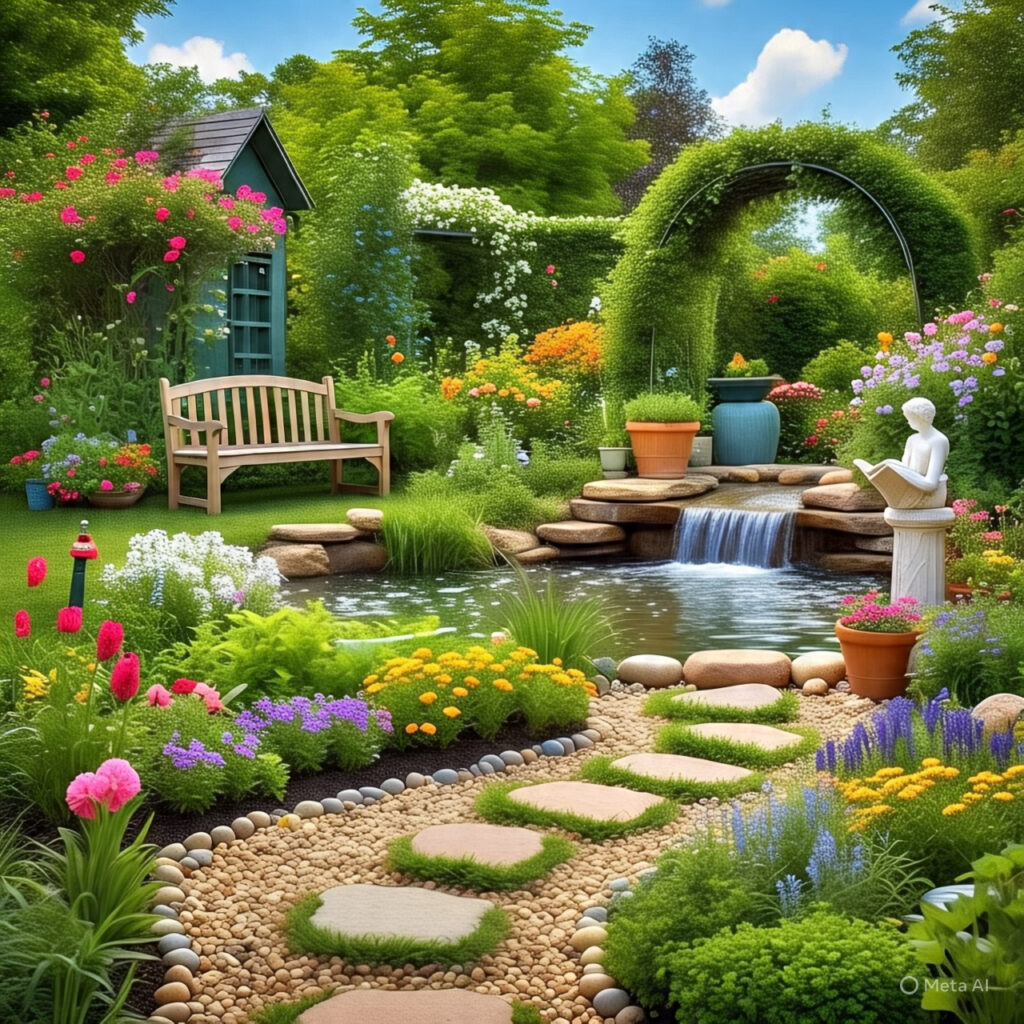
Table of Contents
Introduction
In an era dominated by screens and stress, garden moments of joy offer a quiet, healing escape. Whether it’s the scent of blooming lavender or the soft hum of bees, gardens can transform your mental and emotional well-being. For people in the United States—especially those in urban environments—reconnecting with nature isn’t just a trend, it’s a necessity.
The Science Behind Nature’s Healing Power
Modern research confirms what ancient traditions have known for centuries—nature heals. Studies have shown that spending time in green spaces reduces cortisol (the stress hormone), improves mood, and enhances cognitive function.
Fact: According to the American Psychological Association, spending just 20 minutes in a park can significantly reduce stress and boost feelings of joy.
Relevant Scientific Findings:
- Reduced Anxiety: A 2020 study from Frontiers in Psychology found gardening helps lower anxiety and depression.
- Improved Immunity: Exposure to soil microbes like Mycobacterium vaccae boosts serotonin, improving mood and immunity.
- Enhanced Focus: Children with ADHD perform better after nature walks (University of Illinois).
External Resource: Harvard Health – Nature and Mental Health
Table of Contents
| Section | Description |
|---|---|
| Introduction | Why garden joy matters in modern life |
| The Science Behind Nature’s Healing Power | Research on mental & physical benefits |
| 10 Garden Moments That Spark Joy | Specific activities that boost wellness |
| How Gardening Enhances Emotional Well-Being | The therapeutic role of soil and sunlight |
| Nature and Mindfulness: A Powerful Duo | Using gardens for stress relief |
| Stories from Gardeners | Real-life testimonials |
| Tips to Create Joyful Garden Moments | How to personalize your green space |
| Urban Gardening: Joy in Small Spaces | Bringing peace to apartments & cities |
| Final Thoughts | Why gardens are sacred spaces |
10 Garden Moments That Spark Joy

Here are ten real-life, joyful garden experiences that deeply nourish the soul:
- Watching a bud bloom in real-time
- The first smell of wet earth after watering
- Butterflies dancing over marigolds
- Harvesting your first home-grown tomato
- Planting something with your child
- A quiet evening under fairy lights in your backyard
- Hearing birds chirp during morning watering
- Feeling the soil with bare hands (earthing)
- Seeing a bee pollinate your lavender
- Sitting barefoot in grass and meditating
Each of these moments creates calm, joy, and a profound connection with life itself.
How Gardening Enhances Emotional Well-Being
Gardening is therapeutic. It taps into our natural instincts to nurture life. Every seed you plant and every weed you pull becomes a form of active meditation.
Emotional Benefits Include:
- Reduces Loneliness: Gardening groups and community gardens foster connection.
- Increases Self-Esteem: Watching plants grow builds a sense of accomplishment.
- Eases Grief & Trauma: Horticultural therapy is widely used in trauma recovery programs in the U.S.
Internal Link:
Read more on Sensory Self-Care Rituals for Stress Relief
Nature and Mindfulness: A Powerful Duo
Garden moments of joy are natural tools for mindfulness practice. Whether you’re planting, pruning, or pausing to watch bees pollinate, you’re living in the now.
Mindful Garden Techniques:
- 5-4-3-2-1 Grounding: Use the garden to engage all your senses.
- Walking Meditation: Stroll barefoot on the grass and focus on each step.
- Silent Observation: Sit silently in the garden, noticing sounds and movement.
“To forget how to dig the earth and tend the soil is to forget ourselves.” – Mahatma Gandhi
Stories from Gardeners: Real-Life Joy
Many Americans, especially during and after the pandemic, turned to gardening as emotional salvation.
Name: Maria T., Brooklyn, NY
Story: “My rooftop garden saved my sanity. Watching lettuce grow became my daily therapy. Each sprout reminded me life continues, even in crisis.”
Name: James B., Austin, TX
Story: “I lost my job during the pandemic and started gardening to kill time. Today, I have a thriving backyard and I’ve never felt more peaceful.”
Tips to Create Joyful Garden Moments
You don’t need a large backyard to feel the joy—just intention and consistency.
Simple Ways to Begin:
- Start with container gardening on your balcony
- Grow pollinator-friendly plants (lavender, coneflowers, sunflowers)
- Keep a garden journal to track blooms and moods
- Create a firepit corner or meditation bench in your garden
- Add solar or fairy lights for nighttime serenity
Even five minutes a day in your garden space can shift your emotional energy.
Urban Gardening: Finding Joy in Small Spaces
City dwellers can still enjoy garden moments of joy by using smart strategies.
Urban Gardening Ideas:
| Space | Tip |
|---|---|
| Balcony | Use vertical planters and railing boxes |
| Windowsill | Grow herbs like mint, basil, or rosemary |
| Rooftop | Create community gardens with neighbors |
| Indoor | Try hydroponics or indoor LED plant kits |
External Resource: Better Homes & Gardens – Urban Gardening
Table: Emotional Benefits of Garden Activities
| Activity | Benefit | Time Required |
|---|---|---|
| Watering plants | Reduces anxiety | 5–10 mins/day |
| Planting seeds | Boosts optimism | 30 mins/week |
| Harvesting | Builds joy | Weekly |
| Sitting in the garden | Increases mindfulness | Daily |
| Touching soil (earthing) | Lowers inflammation | 15 mins/day |
Final Thoughts: Gardens Are Sacred Spaces
The secret to happiness might just be growing in your backyard. In a fast-paced world, garden moments of joy are the pauses that help you breathe deeper, think clearer, and feel more alive. Whether you’re digging your hands into soil or watching morning dew sparkle on petals, you’re engaging in a sacred act of healing—for your mind, body, and soul.
Internal Links:
- Tasty High-Protein Desserts for Every Fitness Goal
- 10 Proven Ways to Whiten Your Teeth Naturally at Home
- Step-by-Step Guide to Successful Home Composting
Leave a Reply